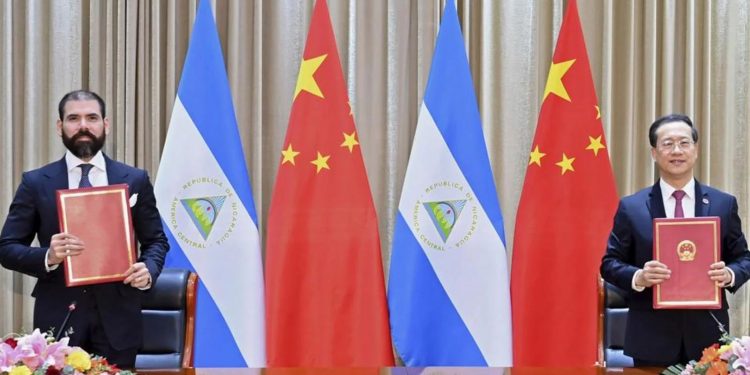Nicaragua inked a deal on Friday switching diplomatic allegiance from Taiwan to China in a political coup for Beijing as it seeks to isolate the democratic island it has vowed to one day seize.
The announcement leaves Taiwan with just 14 diplomatic allies but comes as Taipei strengthens ties with multiple unofficial Western friends including the United States.
China has spent decades encouraging Taiwan’s dwindling diplomatic allies to switch sides, including three others in Latin America in recent years — Panama, El Salvador and the Dominican Republic.
On Thursday, the administration of Daniel Ortega announced that Nicaragua was following suit.
“The People’s Republic of China is the only legitimate government representing all of China, and Taiwan is an inalienable part of Chinese territory,” Foreign Minister Denis Moncada said.
Ortega’s son Laureano Facundo Ortega Murillo led a delegation of Nicaraguan officials who signed a joint communique on Friday in the Chinese city of Tianjin establishing ties.
“This is a correct choice that conforms to broader trends and people’s aspirations. China highly commends this,” Beijing’s foreign ministry said.
Taiwan ‘pain’
Taiwan expressed “heartfelt pain and regret” but it also vowed to continue building alliances elsewhere.
President Tsai Ing-wen dismissed Nicaragua’s rebuff.
“The more international support we have, there will be more pressure from the authoritarian camp,” she told reporters.
In response to Nicaragua’s move the US called on “all countries that value democratic institutions” to “expand engagement with Taiwan”.
China’s Communist Party leaders claim Taiwan as part of their territory and have vowed to one day take the island, by force if needed.
Relations between the two sides have plunged under Chinese President Xi Jinping.
Beijing started ramping up diplomatic, military and economic pressure after the 2016 election of Tsai Ing-wen who regards Taiwan as an already sovereign nation and not part of “one China”.
But Beijing’s sabre-rattling has reached new heights in the past 18 months with Chinese fighter jets and bombers now routinely flying into Taiwan’s air defence identification zone.
US pressure
A firebrand Marxist in his youth, Ortega ruled Nicaragua from 1979 to 1990. He previously changed recognition to China in 1985 but a successor switched it back five years later.
Returning to power in 2007, Ortega has won re-election four times, becoming increasingly dictatorial and quashing presidential term limits.
He had previously expressed hopes to establish ties with both China and Taiwan, a concept that Beijing would not condone.
Sociologist and economist Oscar Rene Vargas said the switch could be motivated by an uptick in US pressure and sanctions on Ortega after his victory in a November vote that President Joe Biden described as a “pantomime election”.
Fearing isolation, Ortega was seeking “Chinese political support,” Vargas told AFP.
Taiwan’s remaining allies in Central America are Belize, Guatemala and Honduras. It has ties with a handful of other countries including Haiti and Paraguay.
Honduras looks like it could be the next ally to fall after leftist Xiomara Castro won election earlier this month.
Castro, who will take office in late January, has previously said she plans to make the switch to China.
Outside of Latin America and the Caribbean, Taiwan’s remaining diplomatic allies are limited to four small Pacific island nations, Eswatini in Africa and the Vatican.
‘More critical’
However multiple powerful Western allies continue to maintain de facto diplomatic relations with Taipei and those relationships have strengthened in recent years as China’s threats of invasion have become more pronounced.
In recent months, there has been a flurry of diplomatic activity in Taipei with multiple delegations from the United States and several European nations visiting.
Taiwan’s digital minister and its envoy to Washington are currently attending Biden’s “Democracy Summit” — an invitation that infuriated Beijing.
Smaller European nations have also reached out.
Last month, China downgraded diplomatic ties with Lithuania after Vilnius agreed to let Taiwan open a trade mission. A Slovakian delegation visited this week.
Jessica Drun, an expert at the Atlantic Council, said Taiwan will likely be unruffled by the loss of another diplomatic ally.
“I personally believe that Taiwan’s unofficial relationships are more critical than its official ones,” she told AFP.
Timothy S. Rich, a scholar at Western Kentucky University who studies Taiwan’s diplomatic relations, said people should not “overstate the importance” of Nicaragua’s switch.
“Taiwan has effectively blurred the distinction between official and unofficial relations with many countries, including most democracies, in that Taiwan gets most of the benefits of diplomatic relations in practice,” he told AFP.











